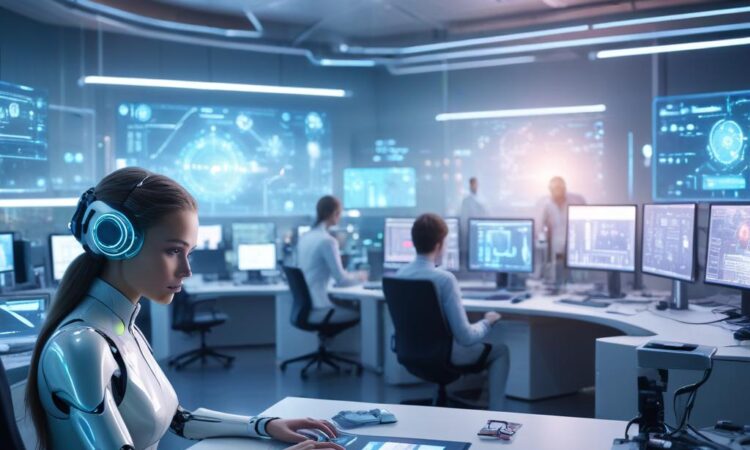Artificial Intelligence (AI) and Automation: The Future of Work
The rapid development and adoption of AI technologies, particularly in areas like customer service, manufacturing, and healthcare, is driving discussions about job displacement, ethical considerations, and the future of work. AI is transforming industries and reshaping the way we live and work.
The Rise of AI and Automation
Artificial intelligence (AI) refers to the simulation of human intelligence processes by computer systems. These processes include learning, problem-solving, and decision-making. Automation, on the other hand, involves using technology to perform tasks that were previously done by humans. The combination of AI and automation is leading to significant changes in the workforce.
Impact on Jobs
One of the most discussed aspects of AI and automation is their potential impact on jobs. While AI can create new jobs in fields like AI development and data science, it also has the potential to automate tasks currently performed by humans. This has raised concerns about job displacement, particularly in industries with repetitive and routine tasks.
Examples of AI and Automation in Different Industries
Customer Service
AI-powered chatbots are increasingly used to handle customer inquiries, providing 24/7 support and resolving issues quickly. This technology can reduce wait times and improve customer satisfaction.
Manufacturing
AI-powered robots and automation are transforming manufacturing processes, increasing efficiency and productivity. They can perform tasks that are dangerous or repetitive for humans, leading to safer working environments.
Healthcare
AI is playing a growing role in healthcare, from diagnosing diseases to developing new treatments. AI algorithms can analyze medical data to identify patterns and predict potential health risks. AI-powered tools can also assist doctors in making more accurate diagnoses and treatment plans.
Ethical Considerations
The rapid advancement of AI raises ethical considerations. Some concerns include:
- Bias in AI systems: AI algorithms can perpetuate existing biases in data, leading to unfair or discriminatory outcomes.
- Privacy concerns: AI systems collect and analyze vast amounts of personal data, raising concerns about privacy and data security.
- Job displacement: The potential for widespread job displacement due to automation requires careful planning and policy interventions to ensure a smooth transition for workers.
- Accountability: Who is responsible for the actions of AI systems? Establishing clear guidelines and accountability mechanisms is crucial.
The Future of Work
The future of work in the age of AI and automation will be characterized by:
- Upskilling and reskilling: Workers will need to adapt and acquire new skills to remain competitive in the changing job market.
- Collaboration between humans and AI: AI will augment human capabilities, allowing us to focus on higher-level tasks that require creativity, critical thinking, and social intelligence.
- Increased demand for skilled workers: As AI takes over routine tasks, the demand for workers with specialized skills and knowledge will increase.
- Focus on human-centered design: AI systems should be designed to benefit humanity and promote well-being.
Conclusion
AI and automation are transforming the world around us, creating both opportunities and challenges. By addressing ethical concerns, investing in education and training, and promoting collaboration between humans and AI, we can harness the power of these technologies to create a more prosperous and equitable future.

